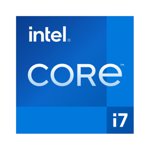Intel Core i7-11700K (11700KF)
CPUProduct Gallery

Product Overview
Intel Core i7-11700K is an unlocked (K-series) desktop microprocessor in Intel's 11th-gen Core, Rocket Lake family. It is also available without integrated graphics in the form of i7-11700KF.
Like its predecessor, the Core i7-11700K comes with 8 cores and 16 threads. However, its single-core maximum frequency via Intel Turbo Boost Max Technology 3.0 is reduced to 5.0GHz. Likewise, TDP-down frequency and all-core turbo frequency are also down.
Rocket Lake is based on its new Cypress Cove microarchitecture backported to the 14nm process. Intel claims that up to 22% IPC (instructions per clock) increase may be observed over the 10th-gen Comet Lake units under the best-case scenarios.
Another area where Intel improved is the integrated graphics, now named Intel UHD 750. It observes higher base and boost frequencies and includes more transistors.
Last but not least, the new Rocket Lake processors support DDR4-3200MHz memories, though the i7-11700K/KF defaults to 2:1 ratio of DRAM to memory controller at this frequency. Intel also includes PCIe 4.0 support with up to 20 lanes.
Alongside the i7-11700K, Intel also markets the Core i7-11700KF. The "F" designation means the i7-11700KF does not come with the integrated graphics. Intel debuted this concept in 2019 in order to salvage chips with defective GPUs that are otherwise perfect. As a result, the i7-11700KF shares with the i7-11700K all specifications except for the difference in integrated graphics. For desktop users with discrete graphics installed, the F-series chip may be an interesting option, thanks to its lower MSRP.
Three other Core i7 models introduced with the i7-11700K/KF are the i7-11700, the iGPU-less i7-11700F, and the low-powered i7-11700T.
Ratings
What we found
Pros
- New Cypress Cove cores are faster than the Core i7
- Improved CPU performance compared to its predecessor
Cons
- Nothing in particular
What external reviewers found
External score 69%
Pros
- Very good performance
- Strong performance at 4K and 1080p
- Supports all-core Boosts
- High-quality components
- Competitive price/performance ratio for an eight-core CPU
- Low power consumption
Cons
- Lackluster CPU performance
- Lackluster performance at 1080p and 1440p resolution
- Only supports DDR4-3200 with 'Gear 2' setting
- High price
- Higher power consumption than the Core i9-11900K
Your rating:
12345678910
?/10
Price Comparison
As associates of the merchants above, we earn a commission when you make a purchase using the supplied links.
Specifications
[{"Ft":"Connectivity","Fn":"CPU Socket","Fv":"FCLGA1200"},{"Ft":"Connectivity","Fn":"PCI Express","Fv":"20 lanes of 4.0 (1x16 + 1x4, 2x8 + 1x4, or 1x8 + 3x4)"},{"Ft":"Construction","Fn":"Form Factor","Fv":"Desktop microprocessor"},{"Ft":"Construction","Fn":"Lithography","Fv":"14 nm"},{"Ft":"Construction","Fn":"Platform","Fv":"Rocket Lake"},{"Ft":"Dimensions","Fn":"Size | Depth","Fv":"37.5 mm"},{"Ft":"Dimensions","Fn":"Size | Width","Fv":"37.5 mm"},{"Ft":"Function","Fn":"Graphics","Fv":"Intel UHD Graphics 750, base 350MHz, boost 1.3GHz, max memory 64GB"},{"Ft":"Function","Fn":"Operating Temperature","Fv":"Max 100°C T Junction"},{"Ft":"Function","Fn":"Processor | Cores","Fv":"8 cores"},{"Ft":"Function","Fn":"Processor | Threads","Fv":"16 threads"},{"Ft":"Function","Fn":"Resolution","Fv":"Max Resolution 5K DCI via DP (5120x3200@60Hz) or 4K DCI via HDMI (4096 x 2160@60Hz)"},{"Ft":"Function","Fn":"Security","Fv":"Intel AES New Instructions, Secure Key, Intel OS Guard, Intel Trusted Execution, Execute Disable Bit , Intel Boot Guard"},{"Ft":"Function","Fn":"Supported Technologies","Fv":"Intel Deep Learning Boost, Intel Turbo Boost Max 3.0, Intel vPro, Intel Hyper-Threading Technology, Intel Virtualization Technology, Enhanced Intel SpeedStep Technology"},{"Ft":"Function","Fn":"Thermal Solution","Fv":"PCG 2019A"},{"Ft":"Performance","Fn":"Cache","Fv":"16 MB Intel Smart Cache"},{"Ft":"Performance","Fn":"Frequency","Fv":"3.6 GHz Base | 3.1 GHz TDP-down | 5.0 GHz single core / 4.6 GHz all cores Turbo"},{"Ft":"Performance","Fn":"Memory | Capacity","Fv":"Supports up to 128GB"},{"Ft":"Performance","Fn":"Memory | Type","Fv":"DDR4 3200MHz, max 2 channels, max 50GB/s bandwidth"},{"Ft":"Performance","Fn":"Power Consumption","Fv":"125 W TDP / 95 W TDP-down"},{"Ft":"Production","Fn":"Debut","Fv":"2021 Q1"}]
External Reviews
anandtech[1]
Reviewer score 66% (normalized by Neofiliac)Core i7-11700K is rated at 125 W. But in practice for a mild AVX2 workload we saw 225 W of power consumption. Power peaked at an eye-catching 292 W on one of our tests systems. In a core-for-core comparison, Intel is slightly slower and a lot more inefficient. The smart money would be to get the AMD processor.
Pros
- Very good performance
- Low power consumption
- High-quality components
Cons
- High price
- Lackluster CPU performance
pcmag[2]
Reviewer score 66% (normalized by Neofiliac)The Core i7-11700K is the only eight-core Intel 11th Generation chip you should consider in most cases. The main selling point for this processor is availability. At this writing, you can not only find one in stock at all major online outlets, but you can even get one on discount at places like Micro Center.
Pros
- Competitive price/performance ratio for an eight-core CPU
- Strong performance at 4K and 1080p
Cons
- Lackluster performance at 1080p and 1440p resolution
- Higher power consumption than the Core i9-11900K
tomshardware[3]
Reviewer score 76% (normalized by Neofiliac)The Core i7-11700K uses the same eight-core 16-thread silicon as the Core i9-11900K, but there are a few key differentiators. The 11700K has a lower binning that results in lower peak clock frequencies of 5.0 GHz, a 300 MHz reduction compared to the 11900K. It also has lower peak memory frequencies in low-latency Gear 1 mode.
Pros
- Low-latency Gear 1 mode
- Low peak clock frequencies
- Supports all-core Boosts
Cons
- Only supports DDR4-3200 with 'Gear 2' setting
References
<
>
x